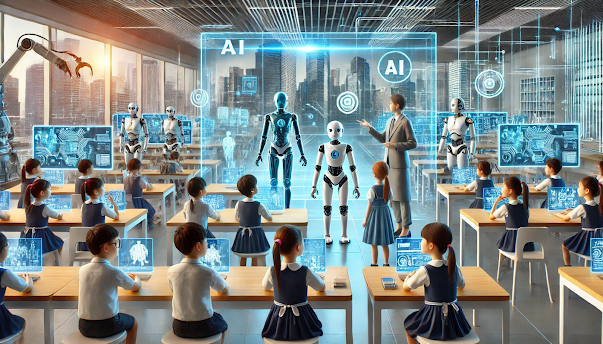Beijing has taken a bold step in shaping the next generation of artificial intelligence (AI) pioneers by introducing AI education to elementary school students. With a structured curriculum integrating AI concepts, chatbot interactions, and ethical discussions, China aims to build a foundation for technological leadership that could rival global AI giants like DeepSeek, whose co-founder Liang Wenfeng exemplifies the nation’s drive for innovation.
China’s AI Education Initiative
The new curriculum, introduced in Beijing’s primary and secondary schools, mandates at least eight hours of AI instruction per year for students, starting as early as six years old. The initiative, reported by Fortune, is part of China's broader AI development strategy, aligning with its ambitions to dominate AI research, applications, and ethical governance.
These young students will engage in:
- Understanding basic AI concepts – learning how machine learning, neural networks, and automation work.
- Interacting with chatbots – gaining hands-on experience with conversational AI.
- Exploring AI ethics – fostering awareness of responsible AI use and societal impacts.
This structured program aims to nurture early interest in AI and create a workforce equipped to drive technological breakthroughs in the coming decades.
China’s Vision: Building Future AI Leaders
The initiative aligns with China's Artificial Intelligence Development Plan (2017), which aims to make China the world leader in AI by 2030. By starting AI education at an early age, China is ensuring that its future workforce is not only AI-literate but also innovative and ethically responsible.
China’s AI push is also inspired by figures like Liang Wenfeng, a leading force behind DeepSeek, a Chinese AI company competing with OpenAI and Google DeepMind. By fostering early AI exposure, the government hopes to cultivate more talents like Wenfeng, who can drive indigenous AI innovations rather than relying on Western advancements.
Global Trends: AI in Early Education
China is not alone in integrating AI into its education system. Several countries have launched similar initiatives:
- Estonia – Pioneered AI education in schools by incorporating coding and automation concepts in early grades.
- Canada – Introduced AI literacy programs, focusing on critical thinking and ethical AI.
- South Korea – Established an AI-based education strategy, where students learn about machine learning, robotics, and deep learning applications.
These nations recognize the importance of AI literacy in maintaining technological competitiveness in the global economy.
Balancing AI in Education: Challenges and Ethical Concerns
Despite the enthusiasm for AI education, experts emphasize a balanced approach to avoid overdependence on technology. Education leaders stress the need for human oversight, ensuring that AI remains a tool rather than a substitute for critical thinking and creativity.
Key concerns include:
- Over-reliance on AI tools – Students may become passive learners, relying on AI rather than developing analytical skills.
- Ethical and bias issues – AI models may reinforce biases if not carefully trained and monitored.
- Privacy concerns – Integrating AI into classrooms requires stringent data security measures to protect young learners.
Conclusion: Shaping the Future of AI Innovation
By introducing AI education at the elementary level, China is positioning itself as a future AI superpower, ensuring that its next generation possesses the skills necessary to lead in AI development. While the initiative offers great potential, it also requires careful implementation to balance technological progress with ethical considerations.
If executed successfully, this early AI training could propel China to the forefront of global AI leadership, producing innovators who may rival the likes of DeepSeek’s Liang Wenfeng and OpenAI’s Sam Altman. The world will be watching closely as China’s young AI pioneers take their first steps into the future of artificial intelligence.
